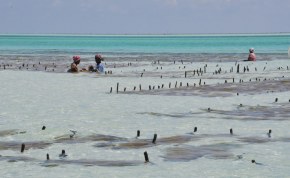
Zanzibar City — Rising sea temperatures and more extreme weather are damaging Zanzibar's formerly thriving seaweed farms, maritime experts say, reducing harvests and putting farmers out of work.
Commercially valuable seaweed was brought to Zanzibar from the Philippines in the 1980s, and early producers found it grew well in the shallow waters off this Indian Ocean island.
Some types of seaweed, used in the food and pharmaceutical industries as a stabilizer or emulsifying agent, are in great demand abroad, and the government promoted it as a useful export crop and source of employment.
Until a few years ago, mariculture - the cultivation of marine organisms in open ocean waters - employed 15,000 to 20,000 'farmers' in Zanzibar, most of them women, and seaweed was one of the island's biggest exports, after spices and fine raffia.
Demand was strongest for high quality red seaweeds such as the Cottonii and Spinosum varieties, but seaweed farmers say those varieties are now proving very vulnerable to changes in growing conditions, which can make the weed lose its colour and, most important, its texture.
FALLING HARVESTS
As an apparent result of warming conditions and storms, Zanzibar's seaweed production has fallen sharply in recent years, from 14,040 tonnes five years ago to just under 10,800 tonnes last year, according to the Department of Marine Resources of Zanzibar.
The Zanzibar Exporters Association said its members collected and exported about 11,000 tonnes of dry seaweed in 2011, most of it going to the United States, France, Denmark, Spain, China and Chile.
Experts have linked the sharp fall to warmer water and turbulent conditions on the seabed because of more extreme weather. Farmers and researchers now hope to create new farms in deeper water, at the lower temperature the seaweed prefers.
The Institute of Marine Sciences at the University of Dar es Salaam says water temperatures around the island have been rising substantially.
"Temperatures in the shallow seaweed farms have increased from below 30 degrees centigrade in the 1990s to about 38 degrees centigrade and slightly above recorded recently," Flower Msuya, a marine scientist at the university, told AlertNet.
The Western Indian Ocean Marine Science Association (WIOMSA), which promotes the conservation of resources and ecosystems on Indian Ocean islands, confirms that weather patterns around Zanzibar are undergoing great changes.
The 2011 rains that killed 20 people in Dar es Salaam - and which the Tanzanian Meteorological Agency described as the heaviest downpour there since independence in 1961 - also affected seaweed farms on the coast of Zanzibar.
No comments:
Post a Comment